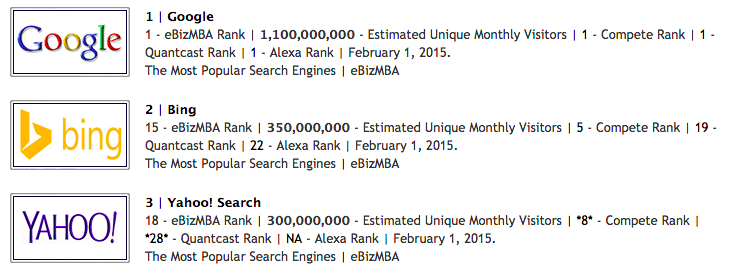Topics:
Search Engine OptimizationSubscribe now and get the latest podcast releases delivered straight to your inbox.
 "Google it."
"Google it."
This is a saying that we've grown used to using as a way to back up our claims (no matter how outlandish they may be.)
However, did you ever stop to think why people don't urge you to "Yahoo! it" or "Bing it"?
Sure, it doesn't seem to have the same ring to it, but do they matter? Are people actually using them?
This past November, Firefox decided to cut ties with Google after ten years of partnership and take on Yahoo! as their primary search engine. Not to mention, Google's deal with Safari is up this year, and rumor has it Bing and Yahoo! want in.
But what does this mean for marketers? Is optimizing for Google no longer enough?
Let's take a closer look.
This is how the top 3 search engines stack up:

(Source: eBiz MBA)
While it's obvious that Google holds a serious advantage over its two successors, Bing and Yahoo still handle a ton of searches.
To put this in perspective, last year Google held 67.4% market share, while Bing had 19.3% and Yahoo! had 10%. (Source: Statistic Brain)
So while it's easy to assume that everyone is in fact, "Googling it", there is a significant amount of people leveraging alternative search engines to turn up results.
Okay. So maybe they do matter. But how does optimizing for Bing or Yahoo! differ from optimizing for Google?
Optimizing for Bing and Yahoo:
While optimizing for Bing and Yahoo! does vary slightly from optimizing for Google, Yahoo! search is powered by Bing, meaning there's only one new set of rules to learn.
Here are a few tips on how to get Bing on your side:
Quality content
Bing uses three pillars to determine the quality of a piece of content. These three pillars include:
Authority
"Can we trust this content?"
When determining the authority of a website, Bing looks to signals from social networks, cited sources, name recognition, and the author's identity.
Utility
"Is the content useful and sufficiently detailed?"
Bing gives preferebce to pages with relevant supporting content such as images, graphs, and instructional videos. In addition, they prefer websites that provide uniqye content, as opposed to sites that syndicate existing resources and information.
Presentation
"Is the content well-presented and easy to find?"
To rank well in Bing, your website must be easy to read with an accessible design that makes content easy for visitors to find.
Sites with layouts that serve content straight up, as opposed to sites that try to blur the lines between advertisements and content, will receibe higher rankings.
Flash
While Google is less receptive to websites with a lot of flash, Bing is willing to provide them with an opportunity to rank high (as long as they are optimized with the necessary on-page elements.)
To ensure that their bots can successfully crawl these types of pages, it's important that you:
1) Start with basic SEO
- Descriptive <title> tag
- Descriptive name='description' <meta> tag
- Descriptive <h2> tags
- Text-based navigation links
- Descriptive alt text
- Text in images, animations, and within script
- Meaningful application name
2) Employ graceful degradation techniques
For more on this, check out this resource from Bing's webmasters.
Mobile
In November, Bing announced that they would be employing new mobile crawlers in an effort to help them uncover and understand different forms of mobile content.
According to their blog, the following relevancy factors to be of importance when Bing crawls your site:
- Identify and classify mobile and device-friendly web pages and websites
- Analyze web documents from a mobile point-of-view by looking at:
- Content compatibility
- Content readability
- Mobile functionality (to weed out “junk”, that is pages that are 404 on mobile or Flash only etc.)
- Return more mobile-friendly URLs to the mobile SERP
- Ranking the results pages based on all of the above
Free: Assessment

